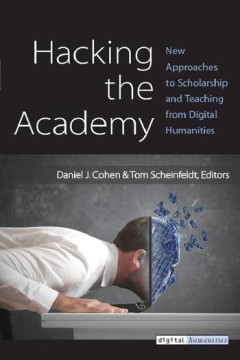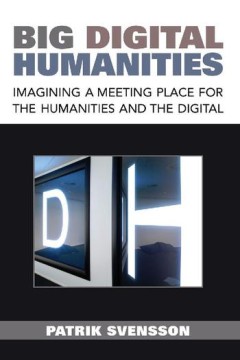Filter by

Global humanitarianism and media culture
There is as yet no collection that examines the longer histories of global humanitarianism and media culture, which would enable readers to consider the various continuities, as well as the differences, characterising the mass media’s relationship with international humanitarian crisis and relief. This collection examines this relationship from the 1950s to the present, from Marshall Plan doc…
- Edition
- -
- ISBN/ISSN
- 9781526117298
- Collation
- -
- Series Title
- -
- Call Number
- 306.4 LAW g

Hacking the academy : new approaches to scholarship and teaching from digital…
An exploration of ongoing efforts to rebuild scholarly infrastructure
- Edition
- -
- ISBN/ISSN
- 9780472071982
- Collation
- 168p. : ill.
- Series Title
- -
- Call Number
- 001.2 HAC h

Interdisciplining digital humanities : boundary work in an emerging field
The first book to test the claim that the emerging field of Digital Humanities is interdisciplinary and also examines the boundary work of establishing and sustaining a new field of study
- Edition
- -
- ISBN/ISSN
- 9780472072545
- Collation
- xiii, 201p. : ill.
- Series Title
- -
- Call Number
- 001.30285 KLE i

Big Digital Humanities : imagining a meeting place for the humanities and the…
Big Digital Humanities has its origins in a series of seminal articles Patrik Svensson published in the Digital Humanities Quarterly between 2009 and 2012. As these articles were coming out, enthusiasm around Digital Humanities was acquiring a great deal of momentum and significant disagreement about what did or didn’t “count” as Digital Humanities work. Svensson’s articles provided a w…
- Edition
- -
- ISBN/ISSN
- 9780472073061
- Collation
- xx, 279p. : ill.
- Series Title
- -
- Call Number
- 001.30285 SVE b

Knowledge and networks
This book discusses a core question in many fields of the social sciences, namely how to create, share and adopt new knowledge. It creates an original space for conversation between two lines of research that have developed largely in parallel for a long time: social network theory and the geography of knowledge. This book considers that relational thinking has become increasingly important for…
- Edition
- -
- ISBN/ISSN
- 9783319450230
- Collation
- XII, 386 p.
- Series Title
- Knowledge and Space
- Call Number
- 304.2 GLU k

Web writing : why and how for liberal arts teaching and learning
Teaching writing across the curriculum with online tools
- Edition
- -
- ISBN/ISSN
- 9780472072828
- Collation
- xv, 257p. : ill.
- Series Title
- -
- Call Number
- 302.231 WEB w

The European higher education area: between critical reflections and future p…
Higher Education; Educational Policy and Politics; International and Comparative Education
- Edition
- -
- ISBN/ISSN
- 9783319208770
- Collation
- -
- Series Title
- -
- Call Number
- 378.4 CUR t

Knowledge from a human point of view
This open access book – as the title suggests – explores some of the historical roots and epistemological ramifications of perspectivism. Perspectivism has recently emerged in philosophy of science as an interesting new position in the debate between scientific realism and anti-realism. But there is a lot more to perspectivism than discussions in philosophy of science so far have suggested.…
- Edition
- -
- ISBN/ISSN
- 9783030270414
- Collation
- -
- Series Title
- -
- Call Number
- 378 CRE k

The emergence of the digital humanities
In The Emergence of the Digital Humanities, Steven E. Jones examines this shift in our relationship to digital technology and the ways that it has affected humanities scholarship and the academy more broadly. Based on the premise that the network is now everywhere rather than merely "out there," Jones links together seemingly disparate cultural events—the essential features of popular social …
- Edition
- -
- ISBN/ISSN
- 9780415635516
- Collation
- vii, 212p. : ill.
- Series Title
- -
- Call Number
- 001.30285 JON e

Digital humanities pedagogy : practices, principles and politics
Academic institutions are starting to recognize the growing public interest in digital humanities research, and there is an increasing demand from students for formal training in its methods. Despite the pressure on practitioners to develop innovative courses, scholarship in this area has tended to focus on research methods, theories and results rather than critical pedagogy and the actual prac…
- Edition
- -
- ISBN/ISSN
- 9782821854031
- Collation
- xix, 426p. : ill.
- Series Title
- -
- Call Number
- 001.30711 DIG d
 Computer Science, Information & General Works
Computer Science, Information & General Works  Philosophy & Psychology
Philosophy & Psychology  Religion
Religion  Social Sciences
Social Sciences  Language
Language  Pure Science
Pure Science  Applied Sciences
Applied Sciences  Art & Recreation
Art & Recreation  Literature
Literature  History & Geography
History & Geography